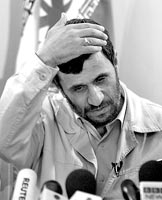
World powers delay action on Iran sanctionsNEW YORK, Saturday (Reuters) - The world's major powers agreed yesterday to delay a vote on tougher sanctions on Iran until late November at the earliest, depending on reports by the U.N. nuclear watchdog and a European Union negotiator. The United States and France had sought swifter action to step up economic and political pressure on the Islamic Republic over its refusal to halt uranium enrichment, which the West suspects is aimed at developing nuclear arms. But foreign ministers of the United States, Russia, China, Germany, France and Britain asked EU foreign policy chief Javier Solana to hold more talks with Iran's national security chief, Ali Larijani, while the International Atomic Energy Agency tries to clear up doubts about past nuclear activities.
“We agree to finalize a text for a third U.N. Security Council sanctions resolution ... with the intention of bringing it to a vote ... unless the November reports of Dr. Solana and (IAEA chief) Dr. (Mohamed) El Baradei show a positive outcome of their efforts,” they said in a joint statement. The decision to make another stab at the European Union-led diplomacy while brandishing the threat of fresh sanctions if it fails reflected a compromise among the major powers. In a sign of the divisions, Russia stressed negotiations while the United States emphasized the threat of sanctions. “What we discussed is to concentrate on doing everything to help negotiations to succeed,” Russian Foreign Minister Sergei Lavrov told reporters. In contrast, U.S. Secretary of State Condoleezza Rice said the big powers would carefully assess whether the IAEA and EU make headway, adding “we can move to Security Council sanctions should there not be progress.” French Foreign Minister Bernard Kouchner said the ministers reviewed a list of 14 possible sanctions, ranging from financial and investment freezes to travel and visa bans, an arms embargo and possible restrictions on oil trading. He told reporters it was a success that the international community had remained united, praising Lavrov for dropping his opposition to any mention of the prospect of more sanctions. The group's political directors are likely to meet twice over the next month to draft a new sanctions resolution ahead of reports from Solana and the IAEA in late November. A European diplomat involved in the process called the statement “a victory for unity over haste,” noting that tough negotiations lay ahead both on the content of possible sanctions and on what would constitute progress by Iran. Russia and China opposed an early move to tighten economic sanctions, saying Tehran should be given more time to cooperate with the IAEA to shed light on its past activities. Iran's foreign minister, speaking as the major powers met elsewhere in New York, defiantly said sanctions would not change what he called Tehran's “rational” nuclear policy. |
|| Front
Page | News | Editorial | Columns | Sports | Plus | Financial
Times | International | Mirror | TV
Times | Funday
Times || |
| |
Reproduction of articles permitted when used without any alterations to contents and the source. |
© Copyright
2007 Wijeya
Newspapers Ltd.Colombo. Sri Lanka. All Rights Reserved. |
